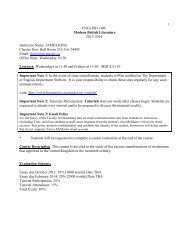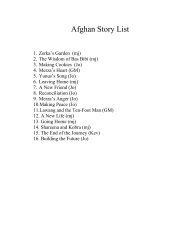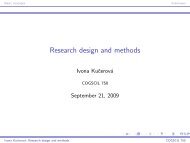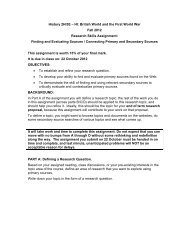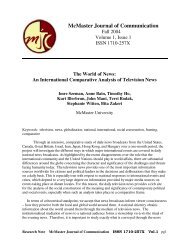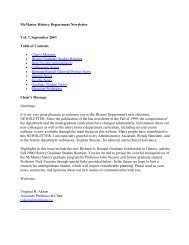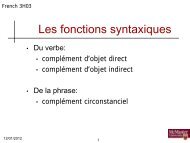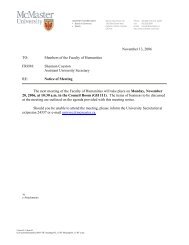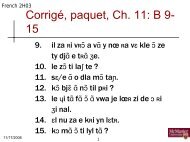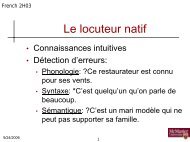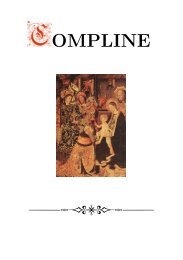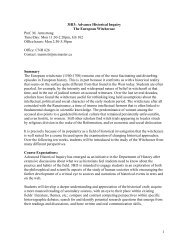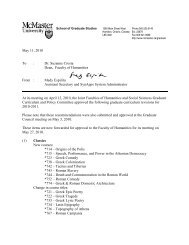MCMASTER UNIVERSITY DEPARTMENT OF HISTORY History ...
MCMASTER UNIVERSITY DEPARTMENT OF HISTORY History ...
MCMASTER UNIVERSITY DEPARTMENT OF HISTORY History ...
Create successful ePaper yourself
Turn your PDF publications into a flip-book with our unique Google optimized e-Paper software.
<strong>MCMASTER</strong> <strong>UNIVERSITY</strong><br />
<strong>DEPARTMENT</strong> <strong>OF</strong> <strong>HISTORY</strong><br />
<strong>History</strong>/Peace Studies HIST 2JJ3<br />
Africa Since c.1800<br />
Winter 2013<br />
This course examines the emergence of contemporary Sub-Saharan Africa though a<br />
broad survey of the continent’s history from the European colonial conquest of the late<br />
19 th century to the independent states of the present day. With reference to the colonial<br />
period, the course will focus on conquest and resistance, the experience of colonial rule,<br />
African nationalism and decolonization. For the post-independence period, key issues<br />
will include concepts of development and underdevelopment, the nation state in Africa,<br />
poverty and debt, the impact of the Cold War and post-Cold War conflict. Rather than<br />
narrating a series of dates and events, special attention will be given to historical<br />
processes, trends and debates.<br />
Instructor:<br />
Prof. Jeffrey Gunn Email: gunnj@mcmaster.ca<br />
Office: CNH-616 Office Hour: Tuesday 5-6 pm Phone: 905 525 9140 ext. 24153<br />
Time/Location: Lectures – Tuesday 7:00-9:00 pm – Burke Sciences Building –B135<br />
Tutorials:<br />
01 BSB/B135 Tuesday 18:00-19:00<br />
02 BSB/B138 Tuesday 18:00-19:00<br />
03 BSB/B139 Tuesday 18:00-19:00<br />
04 BSB/B140 Tuesday 18:00-19:00<br />
05 BSB/B138 Tuesday 21:00-22:00<br />
06 BSB/B139 Tuesday 21:00-22:00<br />
07 KTH/103 Tuesday 21:00-22:00<br />
08 BSB/B135 Tuesday 21:00-22:00<br />
REQUIRED TEXTS<br />
Erik Gilbert and Jonathan T. Reynolds. Africa in World <strong>History</strong>: From Prehistory to the<br />
Present. Upper Saddle River, N.J.: Pearson, 3rd edition, 2012.<br />
Esperanza Brizuela-Garcia and Trevor R. Getz. African Histories: New Sources and<br />
New Techniques for Studying African Pasts. New York: Pearson, 2012.<br />
Seminar Readings are to be obtained online from JSTOR and PROJECT MUSE<br />
accessible through the Mills Library website.
Evaluation:<br />
Participation = 10%<br />
Test = 20%<br />
Research Paper = 40%<br />
Final Examination = 30%<br />
Deadlines/Dates:<br />
Test: 5 February<br />
Research Paper: 19 March<br />
Exam: TBA<br />
Test: The test will consist of two sections:<br />
A: A map quiz on the colonies in 20 th century Africa.<br />
B: A selection of important terms and names from the lectures and readings up to that<br />
point in the course.<br />
RESEARCH PAPER: Producing a research paper is a central activity of this course.<br />
You are free to select any topic relating to African history since 1800. However, students<br />
are strongly advised to consult with the instructor before finalizing their topics. The<br />
paper should be roughly 2500-3500 words long with footnotes or endnotes and a<br />
bibliography. The paper must be typed/word processed. Research papers are expected to<br />
make extensive use of appropriate secondary sources such as academic journal articles<br />
and books. Students should avoid using course texts, lecture notes or websites (online<br />
academic resources like JSTOR are fine) as cited sources in essays. Late assignments will<br />
NOT BE ACCEPTED. If you have a problem meeting a deadline, come and discuss it<br />
with the instructor. Extensions can be granted when appropriate.<br />
Suggested Essay Topics include:<br />
1. A critical appraisal of Colonial Administrative Policies in Africa.<br />
2. An examination of nationalist movements for independence and decolonization in<br />
a particular African country or region.<br />
3. An examination of processes of modern nation building in Africa (ie. Economic<br />
Developments; Political Changes; Conflicts, etc.). Essays must focus on a<br />
particular country, region or event.<br />
PARTICIPATION: Your presence and participation at all tutorials are vital for the<br />
success of the course, and for your success in it. Attendance will be taken and marks<br />
deducted for unexcused absences. In the case of illness or emergency students should<br />
make an effort to contact the instructor beforehand. In order to prepare for tutorial,<br />
students should read the assigned reading(s) and make notes, picking out the underlying<br />
concepts, arguments and ideas, and pin-pointing the author's particular perspective or<br />
point of view. The tutorial grade is based on attendance and the quality and quantity of
participation. You should aim to participate at least twice in seminar in order to receive a<br />
grade of C or higher for this component of the course.<br />
EXAMINATION: The final exam will be three hours in length and test students on<br />
all course lectures and readings. Students will be asked to write an essay from a choice<br />
of several questions and answer 10 identification questions from a choice of at least<br />
fifteen terms. Students will also be required to identify and label information relating to<br />
colonial political spheres and independence dates on a map of Africa.<br />
COURSE GOALS: As a second year course, Africa Since c.1800 (HIST 2JJ3) is<br />
intended to introduce students to the subject of African <strong>History</strong> and related historical<br />
debates, interpretations, methodologies, and intersections with other disciplines. Students<br />
will be encouraged to conduct independent research and gather, review, evaluate, and<br />
interpret secondary evidence; explore different approaches to problem solving while<br />
critically assessing the ideas of other historians; formulate original historical arguments<br />
in a critical and analytical fashion; and communicate the results of their studies orally and<br />
in writing. Students will be encouraged to develop their written and oral communication<br />
skills through research essays and class discussion developing their critical thinking and<br />
ability to conceptualize. Students on completing the course successfully should<br />
understand the basic conventions of historical writing, the rules of academic integrity and<br />
professionalism, the importance of personal initiative and accountability, and the<br />
evolving nature of historical knowledge.<br />
Changes and Modifications: The instructor and university reserve the right to<br />
modify elements of the course during the term. The university may change the dates and<br />
deadlines for any or all courses in extreme circumstances. If either type of modification<br />
becomes necessary, reasonable notice and communication with students will be given<br />
with explanation and the opportunity to comment on changes. It is the responsibility of<br />
the student to check their McMaster email and course websites weekly during the term<br />
and note any changes.<br />
Email Policy: It is the policy of the Faculty of Humanities that all email<br />
communication sent from students to instructors (including TAs), and from students to<br />
staff, must originate from the student’s own McMaster University email account. This<br />
policy protects confidentiality and confirms the identity of the student. Instructors will<br />
delete emails that do not originate from a McMaster email account.<br />
Academic Integrity: Statement of Academic Integrity and Dishonesty:<br />
McMaster University and the Department of <strong>History</strong> state unequivocally that it demands<br />
scholarly integrity from all of its members. Academic dishonesty, in whatever form, is<br />
ultimately destructive of the values of higher learning; furthermore, it is unfair and<br />
discouraging to those students who pursue their studies honestly. Academic dishonesty<br />
consists of misrepresenting by deception or by other fraudulent means and can result in<br />
serious consequences, e.g. the grade zero on an assignment, loss of credit with a notation<br />
on the transcript (notation reads: “Grade of F assigned for academic dishonesty”), and/or
suspension or expulsion from the university. It is your responsibility to understand what<br />
constitutes academic dishonesty. For information on the various kinds of academic<br />
dishonesty please refer to the Academic Integrity Policy, specifically Appendix 3, located<br />
at: http://www.mcmaster.ca/univsec/policy/AcademicIntegrity.pdf<br />
Course Policies: In this course we will be using Avenue to Learn (AtL). Students<br />
should be aware that, when they access the electronic components of this course, private<br />
information such as first and last names, user names for the McMaster e-mail accounts,<br />
and program affiliation may become apparent to all other students in the same<br />
course. The available information is dependent on the technology used. Continuation in<br />
this course will be deemed consent to this disclosure. If you have any questions or<br />
concerns about such disclosure please discuss this with the course instructor. To login go<br />
to http://avenue.mcmaster.ca/<br />
STRUCTURE: Every session will consist of a lecture with a background reading<br />
assigned from the Gilbert and Reynolds textbook. Every lecture will be followed by a<br />
seminar discussion of a more specialized reading to be obtained from JSTOR (see above<br />
under required texts).<br />
Course Outline:<br />
Week 1: 8 January - Course Introduction: Nineteenth Century Developments and the<br />
‘Scramble for Africa’<br />
Background Reading: Gilbert and Reynolds, pp. 262-285 (Chapter 14).<br />
Seminar Reading: Newbury, C.W., and A. S. Kanya-Forstner. “French Policy and the<br />
Origins of the Scramble for West Africa,” The Journal of African <strong>History</strong>, Vol. 10, No. 2<br />
(1969), pp. 253-276; Griffiths, Ieuan. “The Scramble for Africa: Inherited Political<br />
Boundaries,” The Geographical Journal, Vol. 152, No. 2 (Jul., 1986), pp. 204-216.<br />
Week 2: 15 January - The Colonial State and Economies<br />
Film: The Magnificent African Cake. Basil Davidson.<br />
Background Reading: Gilbert and Reynolds, pp. 286-313 (Chapter 15).<br />
Seminar Reading: Anderson, David, and David Throup, “Africans and Agricultural<br />
Production in Colonial Kenya: The Myth of the War as a Watershed,” The Journal of<br />
African <strong>History</strong>, Vol. 26, No. 4 (1985), pp. 327-345; Bersselaar, Dmitri van den.<br />
“Missionary Knowledge and the State in Colonial Nigeria: On How G. T. Basden<br />
Became an Expert,” <strong>History</strong> in Africa, Vol. 33 (2006), pp. 433-450.<br />
Week 3: 22 January - Social Change and New Forms of Protest and Accommodation to<br />
1939, Part 1<br />
Film: The Bible and the Gun. Basil Davidson.
Background Reading: Gilbert and Reynolds, pp. 314-338 (Chapter 16).<br />
Seminar Reading: Mungeam, G.H. “Masai and Kikuyu Responses to the Establishment<br />
of British Administration in the East Africa Protectorate,” The Journal of African<br />
<strong>History</strong>, Vol. 11, No.1 (1970), pp. 127-143; Isaacman, Allen, and Barbara Isaacman,<br />
“Resistance and Collaboration in Southern and Central Africa, c. 1850-1920,”<br />
International Journal of African Historical Studies, Vol. 10, No. 1 (1977), pp. 31-62;<br />
Becker, Felicitas. “Traders, ‘Big Men’ and Prophets: Political Continuity and Crisis in<br />
the Maji Maji Rebellion in Southeast Tanzania,” Journal of African <strong>History</strong>, Vol. 45, No.<br />
1 (2004), pp. 1-22.<br />
Week 4: 29 January - Social Change and New Forms of Protest and Accommodation to<br />
1939, Part 2<br />
Background Reading: Gilbert and Reynolds, pp. 314-338 (Chapter 16).<br />
Seminar Reading: Odile, Goerg, “Chieftainships between Past and Present: From City to<br />
Suburb and Back in Colonial Conakry, 1890s-1950s,” Africa Today, Vol. 52, No. 4<br />
(2006), pp. 3-27. Coe, Cati. “Educating an African Leadership: Achimota and the<br />
Teaching of African Culture in the Gold Coast,” Africa Today, Vol. 49, No. 3 (2002), pp.<br />
23-44.<br />
Week 5: 5 February - Africa and the World Wars (1914-1918 and 1939-45)<br />
Background Reading: Gilbert and Reynolds, pp. 314-359 (Chapter 16 and 17).<br />
Seminar Reading: Morrow, John H. “Black Africans in World War II,” The Annals of<br />
the American Academy of Political and Social Science, Vol. 632, No. 1 (2010), pp.12-25;<br />
Simpson, George L. “British Perspectives on Aulihan Somali Unrest in the East Africa<br />
Protectorate, 1915-18,” Northeast African Studies, Vol. 6, No.1-2 New Series (1999), pp.<br />
7-43.<br />
Week 6: 12 February - ***TEST (in class) African Nationalism, Pan-Africanism and<br />
Decolonization (c.1945-80), Part 1<br />
Film: Black Power: Kwame Nkrumah. UhuruMyAfricaTV.<br />
Background Reading: Gilbert and Reynolds, pp. 360-387 (Chapter 18).<br />
Seminar Reading: Presley, Cora Ann. “The Mau Mau Rebellion, Kikuyu Women, and<br />
Social Change,” Canadian Journal of African Studies / Revue Canadienne des Études<br />
Africaines, Vol. 22, No. 3 Special Issue: Current Research on African Women (1988),<br />
pp. 502-527; Ahlman, Jeffrey S. “ The Algerian Question in Nkrumah's Ghana, 1958–<br />
1960: Debating “Violence” and “Nonviolence” in African Decolonization,” Africa<br />
Today, Vol. 57, No. 2 (Winter 2010), pp. 66-84.<br />
Week 7: 19 February – No class –Reading Week
Week 8: 26 February - African Nationalism, Pan-Africanism and Decolonization<br />
(c.1945-80), Part 2<br />
Background Reading: Gilbert and Reynolds, pp. 360-387 (Chapter 18).<br />
Seminar Reading: Teretta, Meredith. “'God of Independence, God of Peace': Village<br />
Politics and Nationalism in the Maquis of Cameroon, 1957-71,” The Journal of African<br />
<strong>History</strong>, Vol. 46, No. 1 (2005), pp. 75-101; Allen Isaacman, “Peasants, Work and the<br />
Labor Process: Forced Cotton Cultivation in Colonial Mozambique 1938-1961,” Journal<br />
of Social <strong>History</strong>, 25.4 (Summer, 1992), pp. 815-855.<br />
Week 9: 5 March - Settler Societies: The Rise and Fall of Apartheid in South Africa<br />
(1948-94) and Late Independence (Angola and Zimbabwe)<br />
Background Reading: Gilbert and Reynolds, pp. 360-415 (Chapters 18-19).<br />
Seminar Reading: Thompson, L.M. “Afrikaner Nationalist Historiography and the<br />
Policy of Apartheid,” The Journal of African <strong>History</strong>, Vol. 3, No. 1 (1962), pp. 125-141;<br />
Brinkman, Inge. “War, Witches and Traitors: Cases from the MPLA’s Eastern Front in<br />
Angola (1966-75),” Journal of African <strong>History</strong>, Vol. 44, No. 3 (2003), pp. 303-325;<br />
Epprecht, Marc. “Black Sin, `Cowboy’ Masculinity: A Genealogy of Homophobia in the<br />
African Nationalist Movement in Zimbabwe to 1983,” Culture, Health and Sexuality,<br />
Vol. 7, No. 3 (May 2005), pp. 253-266.<br />
Week 10: 12 March - The Challenges of Nation-Building, Part 1: Independent Africa<br />
and the Cold War (Economic Development and Underdevelopment/Crises and Conflicts<br />
– 1957-1989)<br />
Background Reading: Gilbert and Reynolds, pp. 388-415 (Chapter 19).<br />
Seminar Reading: Schmidt, Elizabeth. “Cold War in Guinea: The Rassemblement<br />
Démocratique Africain and the Struggle over Communism, 1950-1958,” The Journal of<br />
African <strong>History</strong>, Vol. 48, No.1 (2007), pp. 95-121; Le Billon, Philippe. “Angola's<br />
Political Economy of War: The Role of Oil and Diamonds, 1975-2000,” African Affairs,<br />
Vol. 100, No. 398 (Jan., 2001), pp. 55-80.<br />
Week 11: 19 March - Africa in the Age of Globalization (1989-present)<br />
****SUBMIT RESEARCH PAPERS (During tutorial period)<br />
Background Reading: Gilbert and Reynolds, pp. 388-415 (Chapter 19).<br />
Seminar Reading: Frynas, Jedrzej George, and Manuel Paulo. “A New Scramble for<br />
African Oil? Historical, Political, and Business Perspectives,” African Affairs, Vol. 106,<br />
No. 423 (Apr., 2007), pp. 229-251; Kiarie, Wa’Njoga J. “Language and Multiparty<br />
Democracy in a Multiethnic Kenya,” Africa Today, Vol. 50, No. 3 (2004), pp. 55-73;<br />
Week 12: 26 March - Gender Issues in 21 st Century Africa<br />
Film: Africa Rising. Jamie Doran (Clover Films).
Background Reading: Esperanza Brizuela-Garcia and Trevor R. Getz pp. 139- 271<br />
(Chapter 7-12 – Overview of African <strong>History</strong> Methodology with a focus on retrieving<br />
sources and information on minority groups in Africa in the colonial and post-colonial<br />
eras).<br />
Seminar Reading: Schatz, Enid. “`Take Your Mat and Go!’ Rural Malawian Women’s<br />
Strategies in the HIV/AIDS Era,” Culture, Health and Sexuality, Vol. 7, No. 5<br />
(September-October 2005), pp. 479-492; Kibombo, Richard, Stella Neema, and Fatima<br />
H. Ahmed. “Perceptions of Risk to HIV Infection among Adolescents in Uganda: Are<br />
They Related to Sexual Behaviour?” African Journal of Reproductive Health / La Revue<br />
Africaine de la Santé Reproductive, Vol. 11, No. 3 (Dec., 2007), pp. 168-181; Bongaarts,<br />
John. “Late Marriage and the HIV Epidemic in Sub-Saharan Africa,” Population Studies,<br />
Vol. 61, No. 1 (Mar., 2007), pp. 73-83.<br />
Week 13: 2 April - Course Conclusion and Examination Review.<br />
12 – 20 April – Examination Period



